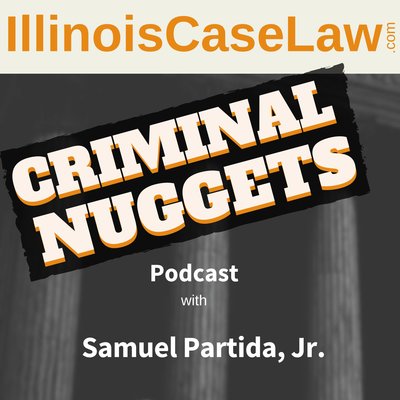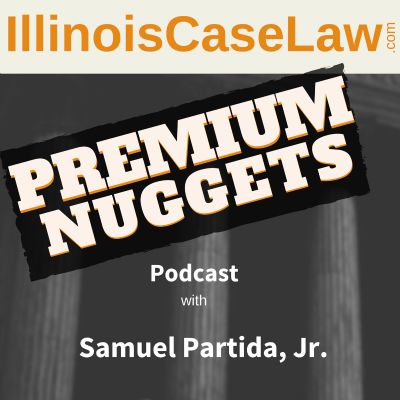Mar 17, 2015
An Illinois reporter’s privilege goes up against a defendant’s due
process rights in this case. Find out who won when the First
Amendment battled the Fifth Amendment.
[powerpress] Subscribe: iTunes | Stitcher | RSS
[youtube]
Facts
The basic idea here is that a reporter was held in contempt of court for refusing to disclose the source of is information in the articles he was writing.
This involved a murder trial against 4 individuals alleged to be involved in the strangling of two victims.
Apparently, the reporter was writing stories about the case that involved details of the events surrounding the murders. It looked like the reporter also got his hands on the police reports as well.
Naturally, one of the Defendant’s wanted to stop these stories because it any potential jury pool would be prejudiced and it made their look client look bad.
Gag orders were filed, motions to compel the other parties to fess up where granted, and everyone involved denied being the “leak.”
Finally, the defense attorney files a motion to divest the author of his reporter’s privilege compelling him to disclose his source of information.
Trial court grants the motion.
The court believed or had grave concerns that -
- One of the attorneys in the case was the leak
- Discovery rules were being violated
- Grand jury secrecy was being violated
- Financial gain may have been motivating the leaker
- Law was being broken
- These leaks would be a huge issue on appeal or postconviction petition
The court was also keenly aware of the reporters First Amendment Freedom of the Press rights but balanced the competing interests in favor of the Defendant’s criminal rights.
The court flatly said -
“This Court is aware of its duty and obligation to protect the First Amendment Rights of the reporters, but cannot envision where those rights are superior to the fair trial rights of individuals charged by the State with the most serious criminal offenses.” ¶ 6.
The reporter was then held in contempt of court, fined $1000 plus $300 for every day of noncompliance, and threatened with incarceration.
Thank goodness, jail was stayed pending the appeal.
Issue
The party asking for the divestiture has to establish some nexus between the news reports and the criminal prosecution. The issue on appeal deals with the scope of relevancy between the leaked information and the court proceeding.
Illinois Reporter's Privilege Law
So lets look at what the applicable law is here in Illinois when it comes to a reporter’s privilege under the freedom of the press. See Reporter’s Privilege 735 ILCS 5/8-901 et seq.; see also People v. Pawlaczyk, 189 Ill. 2d 177, 188 (2000).
“‘The purpose of the privilege is to assure reporters access to information, thereby encouraging a free press and a well-informed citizenry.’ Pawlaczyk, 189 Ill. 2d at 187.” ¶ 11.
Section 8-901 grants the privilege.
“No court may compel any person to disclose the source of any information obtained by a reporter except as provided in Part 9 of Article VIII of this Act.” 735 ILCS 5/8-901.
A party wishing to divest this privilege from the person claiming it must file a written petition with the court that -
- Names the reporter
- Names the news medium
- Identifies the specific information sought
- Identifies the relevancy of the information to the proceedings
- Identifies a public interest adversely affected
Finally, a divestiture order may only be granted after a court considers certain factors described below:
“In granting or denying divestiture of the privilege provided in Part 9 of Article VIII of this Act the court shall have due regard to the nature of the proceedings, the merits of the claim or defense, the adequacy of the remedy otherwise available, if any, the relevancy of the source, and the possibility of establishing by other means that which it is alleged the source requested will tend to prove.”
So When Is the Leaked Information Relevant?
When it comes to determining if the leaked information is relevant to the legal proceeding, the Illinois Supreme Court has said that -
“...a fact is ‘relevant’ if it tends to make the existence of any fact that is of consequence to the determination of the action more probable or less probable than it would be without the evidence.” Pawlaczyk, 189 Ill. 2d at 193.
So relevancy is this context is basically described the same way it is described under the rules of evidence. See Illinois Rules of Evidence 401.
This is a narrow view of the term that the reporter and all the amicus briefs filed in his behalf were requesting.
Analysis
Clearly, in this matter the court granted the divestiture motion not because the reporter’s stories tended to prove or disprove an issue in the murder trial.
Remember, the court had all these other concerns on on his mind. But these are only collateral concerns when they don’t deal with the murder case directly with the elements of the crime charged.
Compelling the reporter to disclose his source is not germane to any fact of consequence to the first degree murder charges against the defendant. No information sought, is material to proof of an element of murder, to proof of the defense asserted by a defendant in this charge, to proof of a reduction in the gradation of the charge, nor to proof to a mitigation of the penalty associated with the charge.
“[R]elevance to such collateral matters is not sufficient to satisfy section 8-904’s threshold requirement that the sought-after information be relevant to the proceedings in which it is being sought. See Pawlaczyk, 189 Ill. 2d at 193-94.” ¶ 14.
Holding
The court’s order granting divestiture, the contempt finding, and all the associated fines and punishment of the reporter were vacated.
Final Remarks
Judge wasn’t crazy.
He had legitimate, serious concerns.
We have seen cases where the written statute doesn’t mean exactly what it says. This, however, is not one of those situations.



